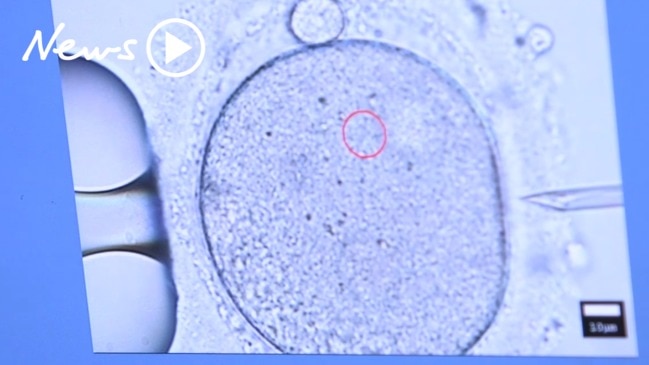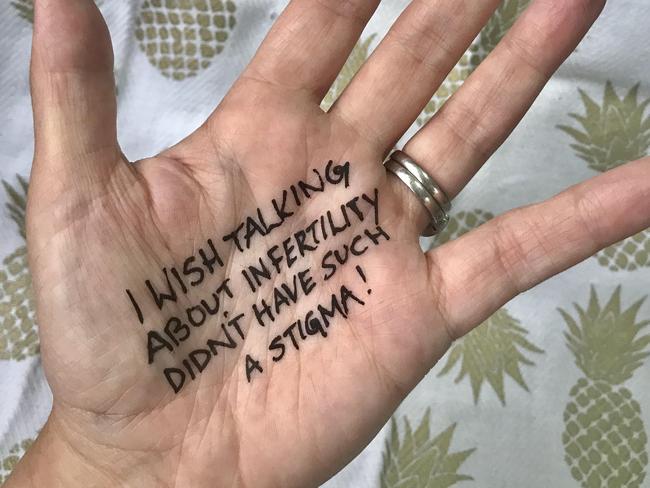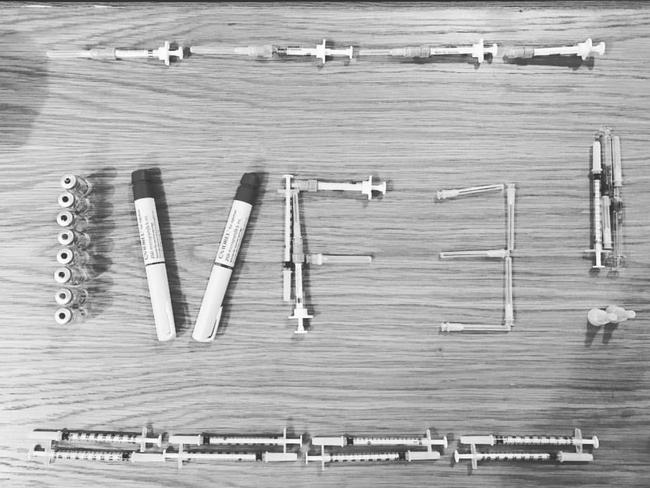The financial and emotional toll of IVF
SHE was willing to try anything to have a baby. But nothing in her life could have prepared her for the real-life traumas of IVF.

Pregnancy
Don't miss out on the headlines from Pregnancy. Followed categories will be added to My News.
I USED to think I could take on anything.
I survived a tough childhood, got the pointy end of the stick in my teens, chose a crap career, lost everything and dated men that were my polar opposite in compatibility. Everything that could go wrong did.
By my mid twenties I could have written a book: “Bad life choices 101”. But I survived, I learnt and I could risk manage in my sleep (you know, just in case Murphy showed up … Again).
By my late twenties I thought all my hard knocks had paid off and I had my collective shit together. I was adulting and doing well at it!
Nothing caught fire or spontaneously combusted for a few years. I got married, much to the shock of my friends and myself, to a kind and patient man. We moved without a hiccup, brought our first home, found a good job and settled in to life.
But none of the experiences, as hard as they had been, could have prepared me for what was next.
WHEN ‘NATURAL CONCEPTION’ FAILS
We were settled in our new home, secure in our jobs and decided it would be the perfect time to embrace family life and add the pitter patter of tiny feet to our home. Being the meticulous planner I am I went to the doctors for a preconception check, general health check and to make sure all my vaccinations were up to date.
Six months passed and nothing happened. We were still within the “normal” time frame. I had further blood tests done and nothing much was apparently found. I asked to go to a fertility specialist but my doctor declined me. I asked a few months later and was met again with a no.
So I started trying every remedy known to man to try and assist conception. I ate pineapple core, drank pomegranate juice, put my legs up after sex, spend hundreds each month on supplements, tried special conception gels, yoni steams, meditation, acupuncture, fertility massages, diet changes, no caffeine, no sugar (or alcohol but that went when we started trying), Chinese herbs.
I tried every bit of advice and fad out there but we still didn’t fall pregnant. Finally after 13 months, and a lot of begging, my doctor gave in and referred me to a specialist.
Initially we went through all the testing. Bloods, samples, ultrasounds (with “Wanda”). We tried less invasive treatments like Clomid and Letrozole (medications that assist in follicle growth and ovulation) but it quickly became apparent that the only way we would potentially become parents was if we moved forward with IVF.
At this time we also joined the wait list to adopt a child in Australia and were promptly told the number of people looking to adopt was much greater than the number of children available. As a country we have support systems in place to assist children in staying with their families, or in foster temporarily until the families are able to look after their children again, which is better for the children. They explained that we would be on a register for two years and if we weren’t selected we could reapply after that time had lapsed. We felt like we were being told not to hold our breath.
THE (VERY INVASIVE) PROCESS
The next step with our IVF was to book in when we wanted to start treatment. Being in my early thirties, and worried about the ticking time bomb of 35 and the little fertility I had left blowing up, I wanted to start treatment as soon as possible. I found the prospects of IVF confronting but it wasn’t until I sat down with the fertility nurse that I realised how invasive and complicated the process was.
To undertake a round of IVF I had to inject myself with Follicle Stimulating Hormones (FSH) for 7-14 days to grow the follicles. Add another injection in at day five to stop them ovulating. Take support medicines, in many different forms, to grow womb lining and support a possible pregnancy. Then on the last day of injections a special trigger shot injection is needed to grow and mature the follicles ready for collection. They collect the eggs with a surgical procedure where they use A BIG NEEDLE that pierces through your uterus wall and in to your ovaries to collect your eggs. Before fertilising them, growing them over 3-5 days and putting one back in and freeze the excess. I don’t know what I thought IVF was prior to that but HOLY HELL that wasn’t it.
LACK OF EMPATHY
I confided in those closest to me. I really needed support, someone to tell me this was a dream, or at the very least some one to hug me and tell me it was going to be okay.
One of my friends was brilliant, supportive, offering to help learn the process to support me. She even offered to help me with the needles as she had experience with them.
But most of the responses weren’t thought out responses, which were unkind, uneducated and hurt a great deal. I had one friend tell me I would NEVER get pregnant because of my stress hormones (not a real thing nor a cause of infertility. My infertility was the result of a diagnosed medical condition). Others told me I should be happy with the life I had and forget it. One friend stopped talking to me all together as she didn’t “agree” with IVF. Another response was “just adopt”.
I had already been feeling isolated but this made me feel like one of the loneliest people on the planet. Only one friend “got it’ and it became easier to distance myself from social situations.
My work life also suffered. I couldn’t sustain treatment and work so I had to reduce my hours. It caused a lot of stress as I needed money to fund fertility treatments but needed time to attend the clinic every second day, time off for the surgery, then to rest after embryo transfer. I struggled to find a balance.

THE PHARMACY OF DRUGS
I psyched myself up for our first round of IVF. I felt mentally, physically and emotionally prepared. And of course life had a chuckle and I was cancelled every month for three months due to cysts or other complications I had never heard of. I hadn’t even started and IVF was already taking a toll on my mental health. FINALLY we were able to start our first IVF. I had no cysts and my body didn’t do anything stupid for a whole month! They handed me two SHOPPING BAGS FULL of medications. I had injections, pills, creams and pessaries coming out of my ears and well ….
I did surprisingly well with the injections (while my husband lay face-in-pillow on the bed complaining of how he felt woozy and his legs felt like jelly due to the thought of needles). I didn’t get many side effects so I could still work, socialise and gym lightly. The surgery went well, the eggs fertilised, they were growing normally. And then they all deteriorated and that was our first IVF cycle over.
WHEN THE DRUGS DON’T WORK
No one warns you that sometimes it doesn’t work. No one tells you that it can go so badly wrong and you can end up with nothing to show for all your hard work. No one tells you that your first IVF is normally the learning cycle and on average it takes 8 rounds to get success. I was devastated and the tears fell freely, behind closed doors, for many weeks. Not that you’d know because life went on behind fake smiles and poor excuses to explain absences from friendships and work.
A few months later we embarked on our second IVF cycle and were left as heartbroken as the first. It was only then we realised how new a technology IVF and how so much of it is trial and error and still unknown.
Again a few months passed and we entered our third cycle for the year. Armed with a new protocol, new medications and a new game plan I felt more confident than ever. Everything grew well, my lining was perfect, the surgery went well, everything fertilised, embryos made it to the freezer as a just-in-case and we transferred a beautiful 9 cell embryo. It could not have gone more perfectly, surely this was our time.

‘NOT VIABLE’
On our two year anniversary of trying to have our baby we received the call from our blood tests only to find out we were pregnant, but it was not a viable pregnancy. We would need to do a repeat blood test in a week and if it did not heal itself then I would need monitoring and possibly a D & C. As well as grieving for our impending loss I found myself riddled with guilt. Over the years I had been confided in by a friend about her early miscarriage. Because I didn’t understand I discounted it. I told her I was sorry, but I didn’t understand enough to give her any further support. And now I had experienced the same fate. It took a lot to make peace with my heart.
“Luckily” my body healed and my next blood test showed the pregnancy had resolved on its own.
We’ve recently expanded our options with adoption and have also listed to be considered for inter-country. This is as far as we can go with adoption.
THE COST
We may get the opportunity to look at a Frozen Embryo Transfer (FET) in the next month or so but we will be taking each month as it comes to ensure we have recovered physically, mentally, emotionally, spiritually and financially from this years treatments. 3 IVF cycles in less than six months has taken a toll on all of the above. This year alone we have spent $31,000 on treatments. And while we qualified for two Medicare IVF rebates our top IVF cover private only covered a very small amount — so most of the money we had to pay out of pocket. But we are forever grateful for the medicine subsidies and the costs that were covered. As well as for Jacob at Medicare who understood how friggen hard IVF is without having to chase money and didn’t make us wait any longer for our rebate.
THE BABY LOTTERY
IVF is not easy and it’s not a solution. Not everyone wins the baby lottery and gets a take home baby.
I want Australians to get a real life view in to what IVF is. So one day people enduring such invasive, expensive and draining treatment can breathe a little easier because people understand. I wish for a world where they don’t have to be ashamed, act like everything is okay when it’s not and have people around them become sensitive to what they are going through — instead of continuously asking why they haven’t started their family.
People suffering infertility need acceptance, understanding and a little leeway. And to not be made to feel like a failure for not winning the baby lotto.
If you take one thing away from this I would ask it to be this: Next time you go to ask your friend, sister, co-worker, neighbour why they haven’t had children yet, because you know they’re closing in on 35 or have been married long enough that they should have bred, please stop and think of the reasons why they may be childless. Choice, Polycystic Ovary Syndrome, Low AMH, Male Infertility, Unexplained Infertility, Cancer — there’s a list longer than my arm. And instead of asking them where there baby is, or offering them your poorly behaved kids, tell them you are there if ever need to talk.
By not prodding you may have saved them a lot of heartache in having to explain why they can’t sustain a pregnancy, energy in having to make up another excuse and embarrassment in not being able to have a baby.
We don’t need to be reminded of the gapping hole in our lives. Every moment, of everyday, in every task we wish for the opportunity to do menial things with our future children. And in our prayers each night we pray for talented doctors, time being on our side and that one day we will be one of the lucky ones and win the baby lottery and get a live birth.
If you have a personal story you would like to share, please email real.life.news@news.com.au.
Originally published as The financial and emotional toll of IVF


